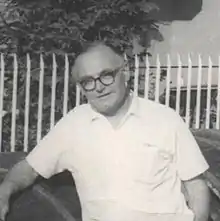James Reeves | |
|---|---|
 James Reeves | |
| Born | John Morris Reeves 1 July 1909 Wealdstone, London Borough of Harrow, England |
| Died | 1 May 1978 (aged 68) Lewes, Sussex,[1] England |
| Occupation | Writer |
| Language | British English |
| Alma mater | Jesus College, Cambridge |
| Period | 1936–1978 |
| Genre | Poetry, plays, children's literature, anthologies |
| Parents | Ethel Blench and Albert Reeves |
James Reeves (1 July 1909 – 1 May 1978) was a British writer principally known for his poetry, plays and contributions to children's literature and the literature of collected traditional songs. His published books include poetry, stories and anthologies for both adults and children. He was also well known as a literary critic and a broadcaster.[2]
Biography
Born in Wealdstone in the London Borough of Harrow, James Reeves attended Stowe School, where he won a scholarship to Jesus College, Cambridge.[1] From 1932 to 1952, he taught English in a number of schools and teachers' training colleges, subsequently becoming a freelance author and editor.[3]
His first collection of poems, The Natural Need, was published in 1936 by the Seizin Press, run by Robert Graves and Laura Riding, whose work Reeves's early poetry sometimes resembles. Numerous further volumes by Reeves include The Imprisoned Sea (1949), The Talking Skull (1958), and Poems and Paraphrases (1972). Collected Poems of 1974 is the fullest edition of his verses. His best work characteristically combines intensity of mood with an understated manner to distinctive and sometimes haunting lyrical effect. The rural descriptiveness of his less distinguished poetry is elsewhere the vehicle for an ironic pastoralism voicing his disaffection with urban modernity. His books of poetry for children were collected as The Wandering Moon and Other Poems (1973).
As an editor, Reeves was prolific, producing many anthologies of prose and poetry, as well as selections from the work of John Donne, Gerard Manley Hopkins, John Clare, and others, including Selected Poems of Emily Dickinson (1959). In this latter book, reprinted several times, he chose to add conventional punctuation to the poems, doing away with her characteristic dashes.
Bibliography
- "The Merry-Go-Round": A Collection of Rhymes and Poems for Children (Heinemann, 1955)
- Pigeons and Princesses (Heinemann, 1956)
- Prefabulous Animiles, illustrated by Edward Ardizzone (Heinemann, 1957)
- A Golden Land (Constable, 1958), editor
- Exploits of Don Quixote (Blackie, 1959)
- The Everlasting Circle: English traditional verse (Heinemann, 1960), folk songs collected by Cecil Sharp
- Georgian Verse (1962), editor
- The Questioning Tiger (1964), poems
- Selected Poems (Allison & Busby, 1967)
- The Cold Flame (1967), children's novel based on a Grimm fairy tale
- Understanding Poetry (1967)
- The Christmas Book, with Raymond Briggs (1968)
- Sayings of Dr. Johnson (John Baker, 1968)
- Commitment to Poetry (1969)
- Inside Poetry, with Martin Seymour-Smith (1970)
- Maildun the Voyager (1971)
- Poems and Paraphrases (1972)
- Complete Poems for Children, illustrated by Edward Ardizzone (Faber, 1973)
- A Vein of Mockery: Twentieth-century Verse (1973)
- The Forbidden Forest (William Heinemann, 1973)
- Collected Poems 1929–1974 (1974)
- More Prefabulous Animiles (1975), poems, with illustrations by Edward Ardizzone
- The Reputation and Writings of Alexander Pope (1976)
- The Closed Door (The Gruffyground Press, 1977), poems
- Arcadian Ballads (Whittington Press, 1978), poems
- The Sea
- Explores
- Underground
- The Wife And The Ghost
- Sky, Sea, Shore
References
- 1 2 Peter Hollingdale, "Reeves, John Morris [pseud. James Reeves]", Oxford Dictionary of National Biography.
- ↑ "James Reeves (Estate)" at Laura Cecil, Literary agent for children's books.
- ↑ "Intense Silence: The Poetry of James Reeves". The High Window. The High Window Press. 28 October 2021. Retrieved 7 December 2021.
External links
- James Reeves in the Oxford Dictionary of National Biography
- James Reeves at Library of Congress, with 125 library catalogue records